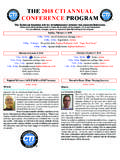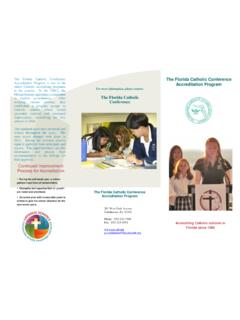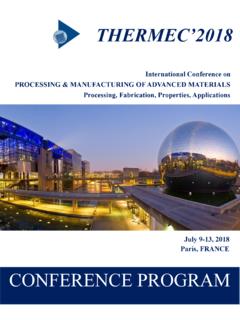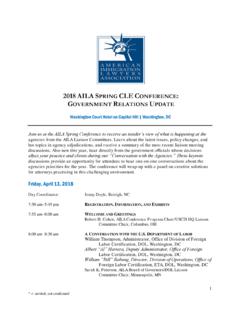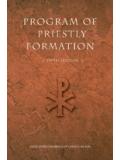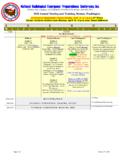Transcription of CONFERENCE PROGRAM AND ABSTRACTS October …
1 CONFERENCE PROGRAM AND ABSTRACTS Historians Against Slavery Biennial CONFERENCE 2017 October 7-8, 10am-5pm International Slavery Museum, Liverpool Register Online: This year, Historians Against Slavery (HAS) is holding its biennial CONFERENCE outside of the United States for the first time, at the International Slavery Museum (ISM) in Liverpool. The two-day CONFERENCE is part of a series of events during the 10th Anniversary of the ISM and also marks UK Black History Month 2017. It is co-hosted by HAS, the ISM, the Centre for the Study of International Slavery (University of Liverpool) and the Antislavery Usable Past project (ASUP, Universities of Nottingham and Hull). SATURDAY October 7 From 9am: coffee and registration : Welcome Addresses Stacey Robertson (Historians Against Slavery) Richard Benjamin (The International Slavery Museum and the Centre for the Study of International Slavery) : Panel 1 The Antislavery Usable Past (chair: Matthew Mason, HAS) Jean Pfaelzer (University of Delaware), Pacific Slaveries and the Long History of Human Trafficking This paper exposes a set of links between human trafficking, empire, and ethnic cleansing and reveals movements of resistance.
2 Drawn from the research for a forthcoming book, California Bound: Slavery in the American West, it considers the legal, political, and colonial origins of human trafficking in the American West through three gendered, racialized and enduring designs of female capture and forced migration. Each historical transfer and forced migration is a corrective to a global narrative that positions human trafficking as a modern phenomenon and to a national narrative that has viewed slavery in the United States as largely a North/South issue. Bharat Malkani (University of Birmingham), The Abolitionist Legacy for Death Penalty Activism The legacy of slavery is woven into the fabric of capital punishment in the USA, and it is little surprise to find historical and conceptual links between their respective abolitionist movements. This paper therefore uses the history of slavery abolitionism to explain and evaluate contemporary approaches to death penalty abolitionism.
3 Orthodox accounts characterize today s anti-death penalty movement as conservative and pragmatic , since abolitionism is generally focused on the unworkability of capital punishment rather than the inherent immorality of state-sanctioned executions. Using the lens of slavery abolitionism, it suggests that death penalty abolitionism is more radical than it first appears, offers means of addressing other issues within the criminal justice system, such as racism, and is continuing the work of the radical slavery abolitionists. Maeve Ryan (King s College London), Towards a 'Grand Strategy' of Modern Antislavery This paper sets British state action on modern slavery as an essential part of forward-looking Global Britain , and makes the case that tackling modern slavery should continue to be a policy priority throughout the complex negotiations and adjustments that lie ahead. Britain s commitment to tackling global slavery is not a nice to have policy that can be sidelined when all energies are being focused on making Brexit work.
4 The paper will argue, using insights from the successes and failures of Britain s anti-slavery past (both in myth and reality), that British anti-slavery policy needs to enter a new, final phase in which the energies and innovations of key stakeholders around the globe are joined up and targeted to maximum effect. Defeating modern slavery and supporting its victims can and should be the success story of our times. This paper begins to think about what a grand strategy of global anti-slavery might look like, and what role Britain could play in making it a reality. : break : Panel 2 Learning and Teaching the History of Slavery (chair: Stacey Robertson, HAS) Johnnie Maberry and Stephen Rozman (Tougaloo College), How to Teach and Study Modern Slavery at a Historically Black College In 2016, Tougaloo College, whose campus was built on the remains of a slave plantation, received a $550,000 Andrew W. Mellon Foundation grant to establish an Institute for the Study of Modern Day Slavery and Antislavery.
5 The first of the HBCUs (historically black colleges and universities) to focus on the topic of modern slavery, Tougaloo aims to give 21st-century meaning to the college s deep roots in the African American struggle, and make it a major centre of antislavery scholarship, pedagogy, and public policy. One of the Institute's co-directors will reflect on the process of developing a new curriculum with an interdisciplinary board of faculty members, including community outreach and core courses for its students. How can this initiative address the closely-linked challenges of the new global slavery and the oppressive practices passed on by the legacies of the old plantation slavery, and develop effective responses to 21st-century enslavement through knowledge of the African American struggle for freedom, justice, and equality? Catherine Armstrong (Loughborough University), The Lecturer's Perspective on Teaching Slavery This talk discusses the pros and cons of an approach to teaching slavery that moves away from a narrow focus on the United States experience, and instead uses a broad global and chronological focus.
6 The undergraduate course in question, 'Slavery in a Global Context, includes Ancient Greece and Rome, India and China, medieval feudalism and serfdom in Russia, the Atlantic world, and the persistence of slavery worldwide in the 19th, 20th and 21st centuries. Students are shown that slavery has not been consigned to the history books, rather that they must apply their learning about historical contexts to understanding why slavery exists today and how to work to stop it. The paper will also examine how teaching slavery can be enhanced by learning methods from the teaching of other painful historical topics such as the Holocaust. Robert Fieldsend (Loughborough College History Teacher), The Teacher s Perspective on Teaching Slavery This talk will focus on education about why slavery existed, and why learning about the cause and consequence of slavery is more powerful than the facts and figures. At A-Level, students discover the factor that drove slavery was greed and exploitation.
7 They encounter human lives being traded for fiscal gain. This paper explores the significance of teaching the why about slavery, and argues that the true mission for the educator is to discover and share this why, in order to ask why dehumanisation and human exploitation continues to happen today. Francesca Hannay (Loughborough University Student), The Student's Perspective on Learning about Slavery This paper by an undergraduate student lays out her learning journey, from learning about North American slavery in a history class when she was 14 years old, to selecting courses as an undergraduate. It explains from a student perspective why it's important to understand that slavery isn't just history, and why good education on slavery is more necessary than ever today. : lunch : Panel 3 Abolitionist Motives (chair: Minh Dang, University of Nottingham) Michael Rota (University of St. Thomas), The Psychology of Moral Judgment and the Abolition of Slavery The 18th and 19th centuries witnessed the emergence and unanticipated success of a popular movement, concentrated in Great Britain and the Northern United States, to abolish the slave trade and outlaw slavery.
8 Why did the abolitionist movement arise when and where it did? This paper draws from research from the field of empirical psychology on the way in which human beings form and maintain moral judgments, the relevance of in-group/out-group distinctions for the elicitation of empathy and altruistic behaviour, and the phenomena of self-deception, to show why residents of Great Britain and the Northern United States in the 18th and 19th centuries were in an unusually good position to perceive the moral wrongness of slavery, and act on that perception. Kristofer Allerfeldt (University of Exeter), Marcus Braun and the History and Politics of Abolition This paper explores Marcus Braun and his motives for fighting sex trafficking in the early 1900s. A larger than life character, Braun s work as special investigator within the US Bureau of Immigration did much to fuel the outrage that led to the Mann Act of 1910 an act that formed the backbone of American anti-trafficking law throughout the entirety of the 20th century and, arguably, even the 21st.
9 The paper will assess his career and abolitionism as a lens for understanding how abolition fervour and the role of individuals in steering public opinion and legislation. Andrea Nicholson (University of Nottingham), Placing Slave Narratives at the Heart of Modern Antislavery Policy This paper addressed the importance of slave narratives to abolition and questions why contemporary slave narratives have not been harnessed when forming state strategies and structures. Survivors often express their hopes post enslavement in terms of how they can realize their freedom and human rights. The paper will examine what survivors say about themselves post enslavement and what this means for the contemporary antislavery agenda. It identifies the strategies that survivors suggest, the issues they encounter, and what freedom means to them in practical terms. : break : Panel 4 Slaveholding Then and Now (chair: Michael Landis, HAS) Talitha LeFlouria (University of Virginia), Race, Gender, and Mass Incarceration in the New South Drawing from the speaker's recent prize-winning book, Chained in Silence: Black Women and Convict Labor in the New South, this paper will set contemporary mass incarceration in the context of the post-Civil War convict leasing system, the early modern prison movement, chain-gang systems and the New South economy.
10 It argues that the incarcerated labor of Black women in Reconstruction-era Georgia, which rebuilt the South's infrastructure and industrial economy under brutal conditions, was enabled by the social language and legal mechanisms around Black lives that persist in America's modern mass incarceration complex. The paper shows mass incarceration and convict leasing as new forms of enslavement, and reveals the root causes of African American injustice in America: race, class and gender oppression. Elizabeth Swanson (Babson College), Denial and Indifference in Historical Proslavery and Contemporary Rhetoric This paper compares antebellum proslavery arguments and contemporary sex worker rights arguments, revealing defence, denial and indifference. It outlines a shared prioritizing of market access expressed via property rights in the former and access to markets in the latter as a means to profit generation. Drawing on a range of literary, historical, and social media sources, the paper shifts the frame of the debate about sex trafficking from its typically designated antecedent, early 20th century "white slavery," to plantation slavery in the antebellum south, and argues for a more nuanced, human rights oriented approach to the commercial sex trade.

